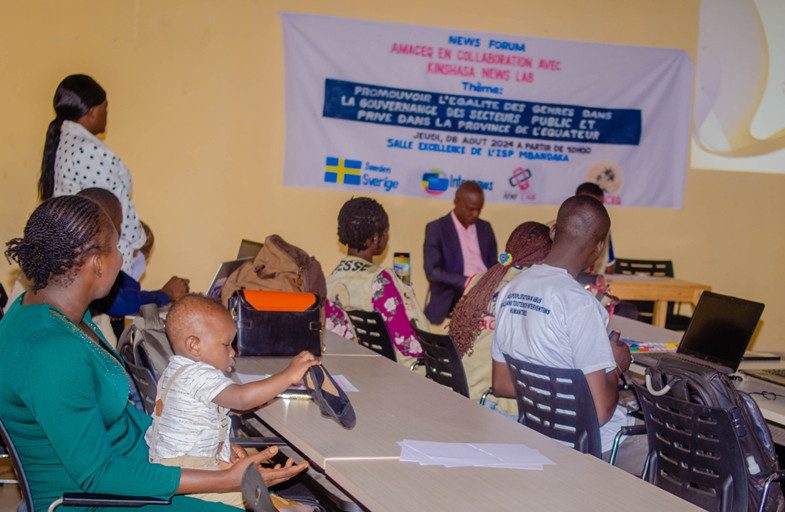On July 11, 2024, Anny Modi (president, NGO Afia Mama) and Sandrine Lusamba (coordinator, Women solidarity for Peace and Development, a renowned women-led organization based in the Ituri Province) participated in a live online debate hosted by actualite.cd, the most popular online news media outlet in the DRC (listen to the podcast created from the recording of the debate – in French). The debate focused on advocating for reforms to increase women’s participation in the public debate. This event was particularly significant as, for the first time in the Democratic Republic of Congo (DRC), a woman, Judith Sumwina, was appointed Prime Minister on June 12, 2024.
Despite some progress, such as the appointment of Jeanine Mabunda as president of the National Assembly in 2019 and Judith Sumwina as Prime Minister this year, women’s participation in public decision-making remains a major issue in the DRC. The country lags behind its neighbors in terms of women’s access to senior positions. For instance, only 13.2% of the Members of Parliament were women in the 2019-2023 legislature, and only 65 women won seats at the National Assembly in the 2023 national legislative elections, highlighting the continued marginalization of women in politics.
With Internews support, Kinshasa News Lab launched several online and radio programs from June 1 to August 31 as part of the #LePouvoirDesFemmes information campaign. This campaign, in collaboration with several Congolese media organizations, aimed to give voice to 24 women leaders on key topics such as women’s participation in political processes, the environment and local governance. The goal was to demonstrate the importance of their perspectives for democratic and efficient public decision-making in DRC.
Kinshasa News Lab partnered with various provincial networks of community radios, including AMACEQ in Mbandaka (Equateur province), REMACK in the Katanga region, CORACON in North Kivu, Radio Amani, the most popular community radio in Kisangani (Tshopo province), and AFEM-SK, the association of women media professionals in Bukavu (South Kivu). These networks produced interviews, podcasts, videos and radio/online debates on women’s participation, peace and security and environmental issues. The focus of Kinshasa News Lab was on highlighting the expertise of these women leaders rather than just their opinions. For example, in a podcast, Flavienne Cimanuka, coordinator of the Gender Department at the South Kivu provincial government, discussed solutions to reduce the number of women accused of witchcraft and subsequently molested or killed in this part of the country.
The campaign produced a total of 52 online content (posters, podcast, videos) that reached more than 1 million social media users. Additionally, 13 magazines and radio debates, broadcasted by 24 community radios reached an audience of 2.1 million listeners in cities such as Lubumbashi, Mbandaka, Kisangani, Bukavu and Goma.
Video: Women’s Equality Begins at a Very Early Age
Founded by actualite.cd management, Kinshasa News Lab aims to build capacities of the Congolese media to integrate new tools and methods, and to enhance thinking and research on the future of journalism in the DRC.
This activity was funded through the 3R-RDC project funded by the Swedish cooperation.
